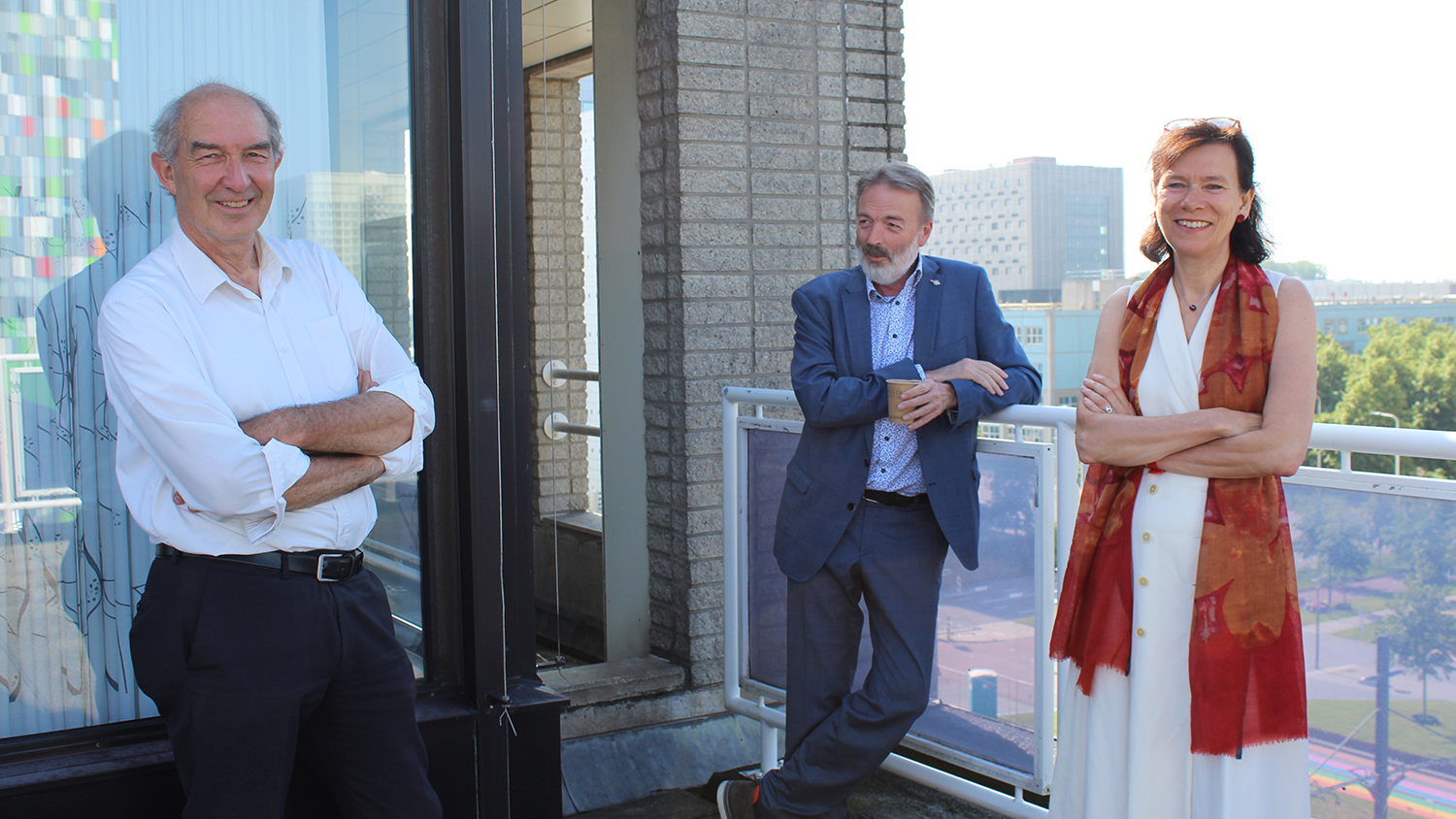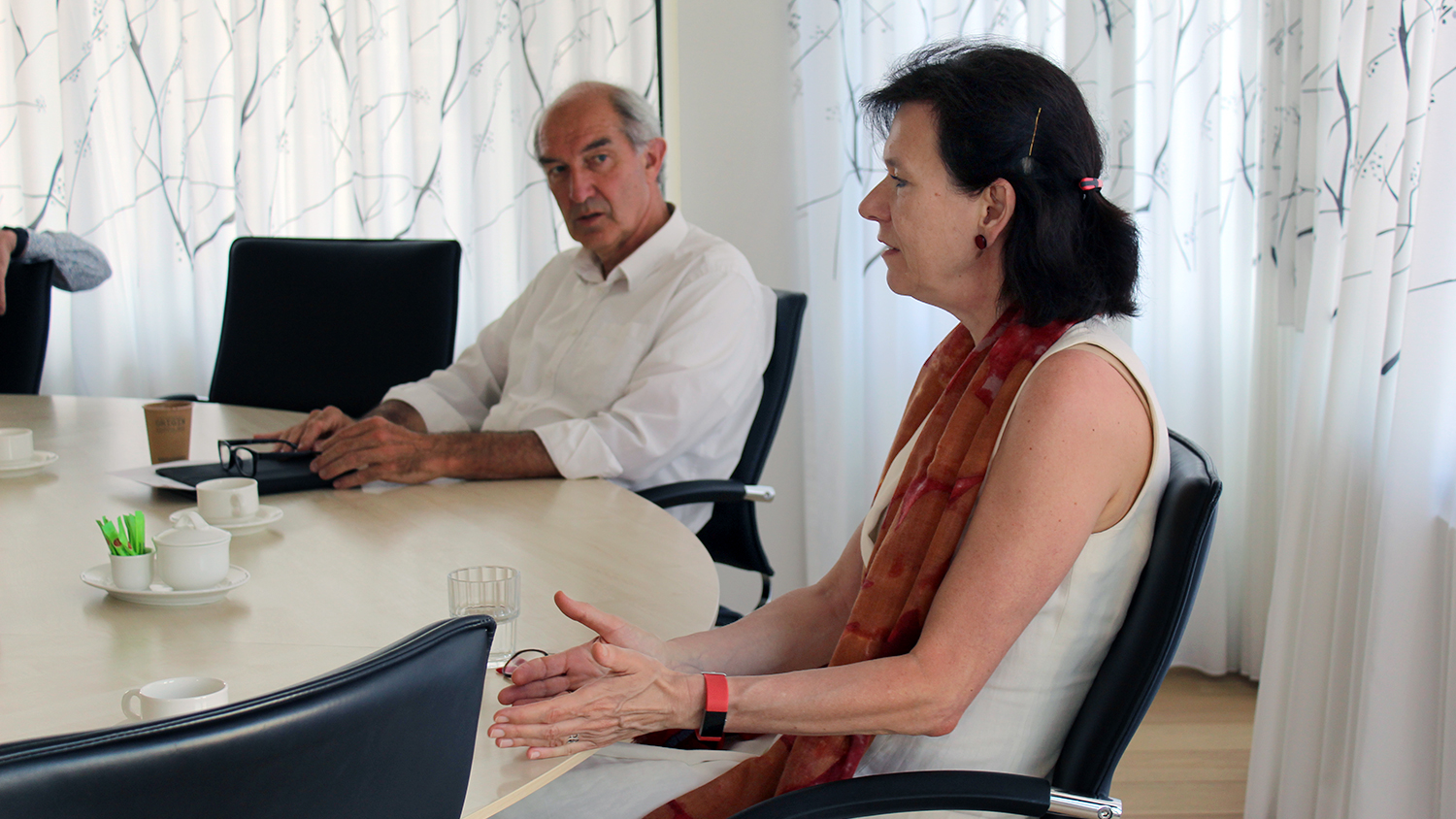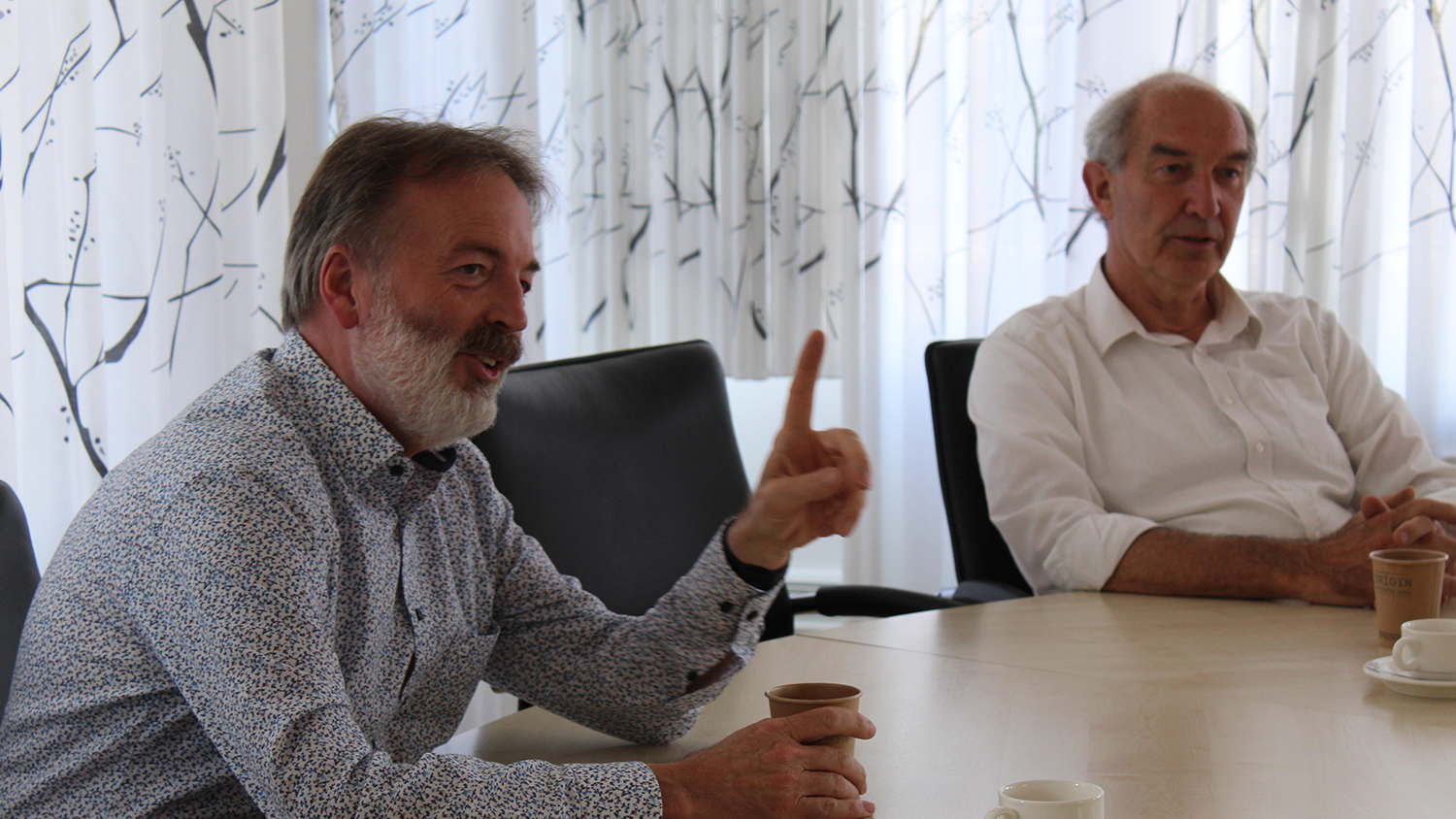Board to put lessons learned from Covid into practice after the summer

The rooms on the fifth floor of the Administration building are soaked in sun on this Monday morning. Executive Board members Henk Kummeling, Anton Pijpers, and Margot van der Starre gather at the outdoor terrace of the curator's room to talk about the events of the previous weekend: the performance of the Dutch national football team was dramatic, but cyclist Mathieu van der Poel’s win made up for it.
A trivial scene, but Covid-19 has turned chats like these into special occasions, as almost everyone was working or studying from home. The same was true for the members of the Executive Board. “I worked from home most of the time, jumping from online meeting to online meeting,” says Rector Henk Kummeling. “I had a weekly meeting with the vice-deans of education, but also talked to research directors and students regularly. That way, we could keep an eye on what was going on and make adjustments whenever necessary. I did miss informal conversations, but we managed to have them online as well. Students would often order drinks and food at home, and then they would tell us what was up with their legs up on the table. We did see some students cry. We heard things that make us think 'damn, we really need to take action right away'. For example, we once had a meeting with study associations and thet said they had nowhere to gather, while other student organisations could still meet up.”

Despite the pandemic, Kummeling thinks it’s not up to the Executive Board to decide top-down what needs to happen. Still, the board is expected to indicate a direction and to coordinate things, so that the entire university is doing the same thing. He says it's not acceptable if a student from a given programme has to deal with completely different Covid-19 measures than a student from another programme.
Board president Anton Pijpers stresses that the pandemic has made for a completely different way of working. “You just keep going, without keeping track of the time. I'd work for twelve hours on end and then suddenly think: 'oh yeah, I haven't eaten anything yet'. We have to learn to make room for rest. But how? I've come to realise that I'm not the only one going through that, it happens to many UU employees as well.”
Looking back, they are proud of the way Utrecht University managed to handle the pandemic. Their compliment applies to teachers, scientists, support staff, and students. Kummeling: “In the National Student Survey, you can see that UU scores higher than other universities with regard to involvement. That’s something to cherish. Good communication matters.”
Margot van der Starre joined the board in the middle of the pandemic. She took the role of vice-president in March, a remarkable way to start. “It takes some getting used to when you're working from home most of the time, or when you come here to a nearly empty building. I come from the healthcare sector, where the motto is 'all hands on the bed'. Out of solidarity, those with managerial positions worked on location as much as possible. That's not the case here. Fortunately, I’m already acquainted with academia, because I worked in a research environment at UMC Utrecht for six years. Even so, I’ve had quite a lot of introductory meetings through Microsoft Teams. Starting a job this way has its benefits, too. I was able to prepare myself, read a lot.”

Last year, Anton Pijpers said things wouldn’t go back to how they used to be. We would get a reset, not a restart. What is the new academic year going to look like?
“I still think we are getting that reset. We have to learn from the pandemic and handle some things differently. One thing that should definitely return is the university as a space for meetings and debates face to face. This past year, we’ve learnt just how important that is,” says Pijpers.
Henk Kummeling adds: “After the summer, we’ll let go of the 1.5-metre rule in class. We’re disregarding the prime minister’s request to work with two scenarios. Most of our people would go crazy if they got such an assignment like. But of course we do have priorities in the back of our minds in case the measures against the virus become stricter again.”
Nevertheless, educational activities are not going back to how they were before Covid. Kummeling: “We already knew that there are much better ways to go about the pure transfer of knowledge than the classic lecture. Thinking about this and the skills to put it into practice, such as recording clips, gained momentum. We need to keep using those alternatives after Covid as well. Face-to-face education will focus more on meetings, debates.
“Another important lesson we've learned from the pandemic is that our exams can be done differently. There are still quite a lot of plain knowledge tests being applied at UU, when there are better options. Another insight is that, sometimes, hybrid classes are a good solution. We’ve got extra lecture halls where students can participate both in person and online. That way, we can teach classes in which international students participate without necessarily being in Utrecht. That’s added value.”
What's more, according to the board members, the university can do with less travel. After all, conferences and international meetings can often be done virtually. That isn’t just good for one’s ecological footprint, it also has financial benefits for the university. In 2020, UU saved around 12 million euros on travel. Kummeling: “I talked to a lot of PhD candidates who were able to attend more conferences now, without travel and accommodation costs. It turns out that it's much easier to chat with the bigwigs of their discipline when the conference is online. When it happens on location, those spots are very limited, but now more people can participate.”

Covid times also challenged the relationship between university and student organisations. What is allowed, what isn’t, and who decides that? The study associations were angry that the board initially banned introduction camps for the new academic year.
Kummeling: “As requested by the associations, we have established rules for UIT (Introduction Days) and the introduction camps organised by study associations. That was in early June, so the rules were based on the national guidelines in place at the time. They were stricter. But the associations wanted to have a clear framework. Now that the more and more relaxations are going into effect, we’re getting more flexible, of course. If the introductory activities have study-related content, they’ll be categorised as educational activities, in which case you can let go of the 1.5-metre rule.
“I don’t agree with the associations that argue that the board should let associations make this type of decisions for themselves. Study associations are closely connected to the study programmes. We’ve got a duty of care, a responsibility for those associations. Imagine a study association organises a camp for a hundred students, and then they ignore the rules: the university would be reprimanded immediately. One thing that’s become clear to me during the pandemic is the differences between associations. Some are very closely tied to the programmes, while others are more independent and very similar to student associations, with some characteristics in common with fraternities. That’ll be a point of discussion next year.”
Education isn’t the only thing that’ll change after the summer. The way other staff works will, too.
“That’s definitely true,” answers Anton Pijpers. “Although that will depend on the type of work someone does. There are jobs that can really only be done on campus. But a lot of office work can be carried out at home. During the pandemic, it became clear to us that many employees actually enjoy working from home as it saves them commute time and they're able to focus better. But there are also people for whom it’s not an option to work from home, because they don’t have an adequate space to work there. Research shows that, on average, UU employees would like to work from home two days a week. So, we want to facilitate that. This increase in the amount of people working remotely also has consequences on campus. UU's 2019 housing plan stated that people who worked part-time wouldn't be allowed to claim a fixed working space for the entire week. Back then, each employee required around 1.3 work spaces. We reduced that to 0.9 in 2019. Now that even more people will work from home, we can reduce it to 0.7 per employee. We’ll consider that in our investments and also in the design of our buildings.”
In practice, that means people won’t have a designated working space anymore.
“It’s true that people will have to work in a different way. You won’t be have your own desk anymore, your working space will depend on the type of task you have to do,” explains Margot van der Starre. She has experienced a similar operation at other organisations, so she is aware of the pitfalls. “You’ll have to start thinking in terms of ‘why am I going to the office?’. Work that requires a high level of concentration will be done at home more often. People will come to the university mostly to meet others. I realise that change takes some getting used to. There are always people who accept the change immediately, while others struggle with it a bit more. It’s important to be able to talk to each other respectfully. Imagine someone’s spending an hour on the phone in one of the quiet rooms: you need to be able to say something about that. And, of course, we have to evaluate things. Not on day one, but after a hundred days. And then see what needs to be adjusted.”
Several faculties are already experimenting with this new way of working. The Administration Building is currently undergoing renovations. Employees allocated there will start working in this manner as soon as the building is ready, after the summer. Each department will have its own home base. And then employees will choose a place to work depending on what they're going to do that day. You may spend one day in a silent room, and the next in a space meant for meetings. There will also be a dedicated room for conversations.
The Executive Board will work that waym too. “We’re going to leave our own ballrooms, too. We’ll have our home base, our own club house,” Kummeling says. But they don’t necessarily have to stay on the fifth floor. Anton Pijpers: “It’s fine by me to go everywhere and work at other departments. Sometimes, I notice that others have a harder time getting used to that.”
Two years ago, employees were very reluctant about working remotely. Now, the policy is focused on it.
“According to research, distrust about working remotely isn’t justified,” states Kummeling. “Most people worked their butts off during this pandemic. At first, they wanted to return to their offices, but now we see many employees actually being reluctant about going back to the office.”
Anton Pijpers: “We'll just need to protect people, because they tend to work longer days when working from home. We also need to provide the amenities necessary for working from home effectively. We’re working on that. Thanks to the pandemic, the process of switching to remote work gained some natural momentum..."
Workloads remain a hot topic. They haven't diminished during Covid.
Anton Pijpers: “It’s a recurring topic. Especially when you realise the number of students is increasing and we have a structural deficit of one billion euros, as recently confirmed by a report by consultancy agency PwC and a study by the Court of Auditors. Not to mention the 149 million euro worth of cutbacks the minister proposed in light of the deficits on the student travel card (OV chipkaart). So we’ll have to continue to exert pressure on The Hague, and the formation of the new cabinet, to ensure that higher education receives more funding.
“On the other hand, we also have to see what we can do internally. UU would like to have more employees under permanent contracts, which has been recently established in the collective labour agreement. We’ll also need to evaluate the division of tasks within teams. Lastly, we’ve got leadership courses to help managers organise things better in their teams.
“As waves of increase and decrease in student numbers can never be predicted with complete accuracy, we’ll discuss the importance and size of the so-called flexible layer over the next few years. How careful are we with our prognoses and how can we ensure that we create enough space to give teachers permanent contracts sooner?”
Margot van der Starre: “As a new employee, I think it’s remarkable that the university has so little influence on the influx of students. You have to accept everyone with a secondary school (VWO) diploma who registers at a programme without a numerus clausus. That’s great, but when the Faculty of Sciences sees an increase of 34 percent in the number of students, that has consequences. If you hire new people, then you need to give them research hours as well. Besides, it’s hard to find suitable teachers, which makes it difficult to adjust the staffing to the number of students. We’ll need to come up with tailor-made solutions.”
How does the new way to ‘recognise and reward’ scientists connect to this idea? Last week, an article about this topic was published by Nature.
“UU has clearly opted for open science, and to assess its scientific staff based on more than just publications. We want to recognise and reward our staff for teamwork and impact as well,” Pijpers explains. “We’re pioneers here, especially internationally. You can see this in the positive response we've received to the Nature article. We’re also seeing it in our conversations with new professors. For some scientists, this approach is precisely reason they chose to come to Utrecht.”
Another hot topic is providing a safe work environment, and how that would be possible in combination with the plan to close eight reception desks. Not everyone is enthusiastic about that idea.
“Change comes with uncertainty,” replies Margot van der Starre. “I understand that people like seeing a familiar face when they enter a building. But I truly think this decision is the right one. Throughout the past few months, I was almost the only one in the building. I wondered: when would I feel safest: when there’s someone sitting at the reception desk or when someone’s walking around to keep an eye on things? I think the latter.
We're talking about receptions where people have relatively little to do. We would be able to give those receptionists more enjoyable tasks. I truly expect that employees will actually feel safer that way. The motto 'evaluate, evaluate, evaluate' applies to this situation, too. This isn't a measure to reduce costs, the idea is to improve things. The ideal scenario would be to have both, but that's not feasible financially."
After the interview, the three members of the Executive Board went on to their next digital appointment. But they also had a hybrid activity that same afternoon: a meeting with the University Council in which some of the members would be sitting together in a room and some other members, alongside the public, would participate online. A taster for the new way of working that will apply to everyone in the upcoming academic year. Nevertheless, the threat of strict Covid-19 measures keeps on creeping around and the lessons learned last year must be put into practice taking this new reality into account.